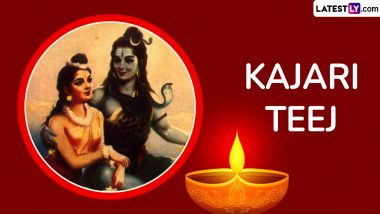Kajari Teej, also known as Badi Teej or Kajli Teej, is a prominent festival observed by women across India, especially in Uttar Pradesh, Bihar, Madhya Pradesh, and Rajasthan. Celebrated on the third day of the dark fortnight (Krishna Paksha) during the Hindu month of Bhadrapada, this festival falls between July and August according to the Gregorian calendar. Ahead of Kajari Teej 2024, know Badi Teej date, auspicious timings, Kajli Teej rituals, significance, dos and don'ts to worship Goddess Parvati. August 2024 Festivals, Events and Holidays Calendar: Complete List of Important National and International Days and Dates in August.
Kajari Teej 2024 Date and Timings
Kajari Teej 2024 is scheduled to be celebrated on August 22, which is a Thursday. The timing of the festivities can vary based on regional customs and astrological considerations. The observance is closely tied to the phases of the moon, emphasising the importance of precise timing in performing rituals.
Kajari Teej Significance
Kajari Teej is deeply rooted in ancient folklore and mythology. One story traces the festival's origins to King Dadurai, who ruled over the Kajali forest in Central India. After his death, his queen, Nagamati, committed Sati—a tragic act of self-immolation on her husband’s funeral pyre. The sorrowful event led the local people to create and sing "Kajari" songs, which became associated with feelings of separation and mourning.
Another legend links Kajari Teej to the devotion of Goddess Parvati for Lord Shiva. According to this tale, Parvati undertook 108 years of penance to win Shiva's love. Moved by her dedication, Shiva married her during Krishna Paksha of the Bhadrapada month. Kajari Teej celebrates this divine union and the steadfast devotion of Parvati.
Kajari Teej 2024: Rituals and Customs
- Fasting and Prayers: Fasting is a central aspect of Kajari Teej. Women typically observe a nirjala (without water) fast, refraining from eating or drinking throughout the day. They create and worship clay idols of Lord Shiva and Goddess Parvati. Offerings to Shiva include Datura, Belpatra, and white flowers, while Parvati is presented with cosmetics and other items.
- Singing Kajari Songs: A key feature of Kajari Teej is the singing of folk songs known as "Kajari." These songs often express themes of separation and longing, reflecting the emotional experiences of women waiting for their beloved or anticipating their return.
- Swinging Traditions: In regions like Rajasthan, women celebrate by participating in Jhulan Mahotsav during Hariyali Teej, which includes swinging, dancing, and singing songs about the divine love stories of Lord Shiva and Goddess Parvati, as well as Krishna and Radha.
- Traditional Clothing: On Kajari Teej, women dress in their finest traditional attire. Sarees in red, green, or yellow are popular choices, although some may opt for ghaghra choli or lehenga choli. The attire reflects the festival’s importance and the celebratory mood.
- Colour Symbolism: The colours worn during Kajari Teej have specific meanings: red symbolises fertility and love, green represents new beginnings and growth, and yellow is associated with happiness and prosperity.
Celebrating Kajari Teej: Dos and Don’ts
- Traditions: To celebrate Kajari Teej properly, it is important to adhere to traditional practices, including fasting, worshipping deities, and performing rituals with devotion.
- Kajari Songs: Kajari songs are an integral part of the cultural heritage in regions like Rajasthan, Uttar Pradesh, Bihar, and Madhya Pradesh. Singing these folk tunes helps preserve and pass on traditional stories and emotions to future generations.
- Kajari: Kajari songs often explore themes of love, longing, separation, and reunion, reflecting the various phases of a woman's life. These songs provide a means for women to express their feelings and connect with others through shared experiences.
Kajari Teej is a festival rich in tradition and cultural significance, celebrated with devotion and reverence. Observing the rituals and customs associated with this day offers an opportunity to honour ancient traditions, express personal devotion, and engage in cultural practices that continue to thrive across generations.
(The above story first appeared on LatestLY on Aug 20, 2024 08:30 AM IST. For more news and updates on politics, world, sports, entertainment and lifestyle, log on to our website latestly.com).













 Quickly
Quickly




















